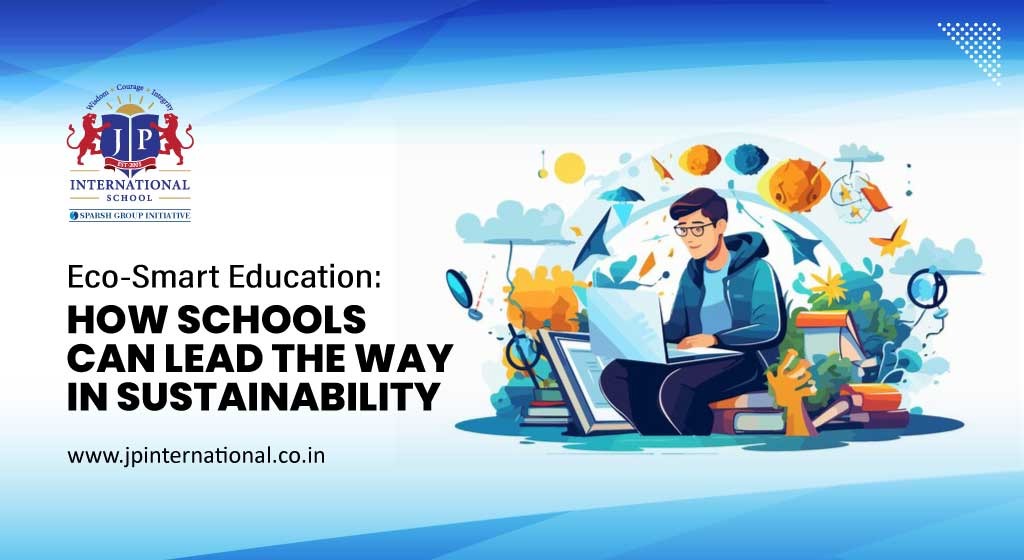

T:+91 7669-933-404
Email: [email protected]
Plot 3A, Sector Omega 1, Near Pari Chowk, Greater Noida, GB Nagar, Pin Code 201308


T:+91 7669-933-404
Email: [email protected]
Plot 3A, Sector Omega 1, Near Pari Chowk, Greater Noida, GB Nagar, Pin Code 201308

Where environmental issues confront all organisations, schools need to produce the next generation of environmental stewards. By introducing, visualising and acting upon sustainable practices at school and teaching students and staff sustainable experiences, educational institutions can contribute to worldwide efforts to save our planet. Eco-smart education nurtures responsibility and compassion for the environment and makes students become innovators.

Schools are just smaller versions of society and their impact transcends learning within the walls of the school alone. Such practices empower students with the necessary skills of the future, where sustainability is going to be a key driver in every line of business. School professionals can facilitate awareness about environmental matters. Topics such as climate change, renewable energy and the loss of biological diversity help students look at the world and consider some of its major problems and their possible solutions. In addition to this, there are concrete measures that can be instituted and implemented in schools to enhance the lessons learned, emphasising on actual implications of sustainability in students’ day-to-day actions.
Schools can embed environmental education into various subjects. For example, science classes can explore renewable energy technologies and the pros and cons of each method, geography lessons can focus on climate change and literature classes can discuss environmental themes in texts. Cross-curricular approaches ensure that sustainability is a consistent focus rather than a standalone topic.
Measures like using LED lights, solar panels and energy-efficient appliances in a school help bring down the carbon imprint. Students can participate in surveys of consumption of energy as a way of engaging them in more effective conservation measures and this will help inculcate sustainable practices.
Waste minimisation is one of the significant features of eco-smart education. Schools should encourage students and others to recycle and reuse items, besides preventing single use plastics and other environment hazards which are non biodegradable. Such information can be extended by implementing further workshops on upcycling and creative reuse, which will eventually help students to focus on the reduction of waste.
Many schools provide a good system for developing green spaces which include school gardens; these not only improve the campus environment but also serve as an experiment ground. It can therefore be said that gardening projects play the following roles in educating children: The general concepts of ecosystems, food production and the role of biodiversity are learned.
Promoting the use of walking, cycling and carpooling will help in decreasing emission related to school-going children. In this case, it will be possible for schools to work with local authorities to enhance the frameworks offering sustainable transport choices, extending the usage of environmentally friendly choices.
Leadership is crucial in establishing a culture of sustainability. School administrators can lead by example, adopting green policies and ensuring that all stakeholders—including staff, students and parents—are involved in the process. Hosting regular eco-awareness events, such as Earth Day celebrations or sustainability fairs, can further strengthen community engagement.
Additionally, schools can collaborate with local organisations and businesses to support environmental initiatives. Partnerships with environmental NGOs, for example, can provide resources and expertise, enhancing the effectiveness of eco-smart programmes.
Technology is an important tool that can help us address the need for sustainability. One can offer assignments and communicate online in order to cut down on the usage of paper. The use of technologies such as virtual reality can enhance the education on the various environmental elements.
It is also possible to establish automated lighting and climate control systems to rationalise the use of resources on campus. Implementation of these technologies also eliminates the costs of obtaining new technologies while at the same time offering students an exemplary model of the practical application of innovations to sustainability.
As society faces increasing environmental challenges, schools have a moral and educational responsibility to lead the way in sustainability. For this reason, by embracing eco-smart education they can develop a generation capable of solving environmental problems with innovation and persistence. They also involve schools in promoting sustainable practices as a model that others too can follow and benefit from.
JP International School is a model of an institution being environmentally friendly. Projects like energy efficient school infrastructure and integrated environmental studies as a curriculum ensures that students are empowered to be environmentally conscious. With intensification of eco-smart education, JP International School sets the pace right; defining sustainability as a responsibility of everyone for a better tomorrow.
Eco-smart education refers to the integration of sustainable practices and environmental awareness into school operations and curricula. It aims to nurture eco-consciousness and prepare students for a sustainable future.
- JP International School19 April 2025
Whether through co-curricular activities, international exposure, or digital learning platforms, ...
12 April 2025
JP International School makes students future-ready by imparting 21st century skills through the ...
5 April 2025
A solid education from school creates opportunities for students to grow into confident, responsi...
29 March 2025
Technology allows students' everyday journey, be it in academics or outside of academics, to be t...
22 March 2025
STEM education prepares students for healthcare careers by combining biology, chemistry and physi...
 28 November 2024
28 November 2024
.jpg) 27 November 2024
27 November 2024
 8 December 2022
8 December 2022
